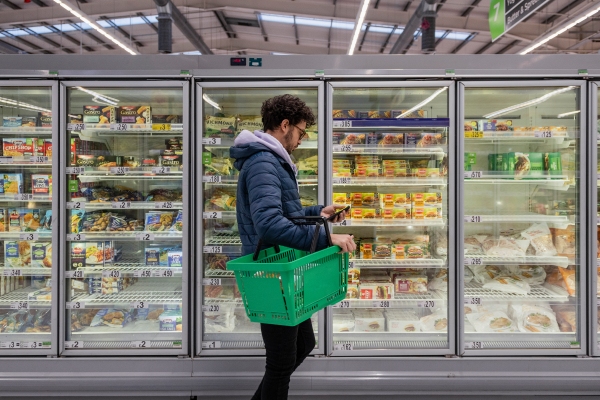
A warming world will need lots of cold drinks. The problem is that current cooling technology is anything but climate-friendly.
The way we cool our food and drinks has hardly changed in a century and the technology still relies on environmentally harmful refrigerants. Now a German start-up thinks it can freeze those refrigerants out of the market with little more than magnets and water, while using up to 40% less energy.
Magnotherm has been refining its technology known as magnetocaloric cooling since it was spawned from TU Darmstadt in 2019. While only an early-stage company, the startup has already shipped five display coolers to beverage giant Coca Cola, businesskinda.com+ has learned, and is on track to build another 55 that will be rented out for events.
But beverage coolers are just the tech demo: “We’re really building a bigger box for supermarket refrigerators,” said co-CEO Timur Sirman. “Here we can actually significantly reduce energy costs and maintenance costs.” The global commercial refrigeration market is worth $37 billion, according to to Grand View Research.
To take advantage of the opportunity, Magnotherm is announcing a seed round today. In an exclusive partnership with businesskinda.com+, Sirman said the company was shooting for $5 million, “and now we’re basically oversubscribed.” Investor interest was so great that they closed the round with €6.3 million.
Extantia Capital led the round, with Hessen Kapital, Lauda Dr. R. WOBSER Beteiligungs-GmbH and Revent. Four investors from the Better Ventures Angel Club also participated.
Dethrone old technology
The technology Magnotherm hopes to dethrone is widely used and deeply entrenched. It’s not as efficient as it could be, but more troubling are the substances it uses to keep things cool. The refrigerator in your kitchen gets its chill from the physical properties of its refrigerants, the gases that circulate through the cooling system.
None of these refrigerants come without compromises. First-generation refrigerants — Freon and its ilk — chewed a hole in the ozone layer. Newer ones are more ozone-friendly, but they are potent greenhouse gases, warming the Earth hundreds to thousands of times more than an equivalent amount of carbon dioxide.
Countries are working to phase out its use, but finding a replacement has not been easy. One of the frontrunners, propane, is flammable and regulators have been hesitant to give the go-ahead for its use in larger refrigerators in case of leaks. Carbon dioxide is another contender, but it only acts as a refrigerant at very high pressures, making the whole system more expensive.
Janice has been with businesskinda for 5 years, writing copy for client websites, blog posts, EDMs and other mediums to engage readers and encourage action. By collaborating with clients, our SEO manager and the wider businesskinda team, Janice seeks to understand an audience before creating memorable, persuasive copy.
















